How Keep Your Baby Safe From Online Threats in 2025

This article is about the potential online threats for babies and ways to tackle them in 2025.
Hello World: Being a Baby Online
Babies born today are entering a world that’s been transformed by the internet and digital technology. In a lot of ways, this is great news for them.
There’s loads of great advice out there for parents, and it’s freely accessible 24 hours a day.
Social media platforms let you share those precious moments with your baby in high definition with relatives and close friends – instantly.
And parents can make use of any number of digital and smart technology products for babies’ education, entertainment, supervision, and safety.
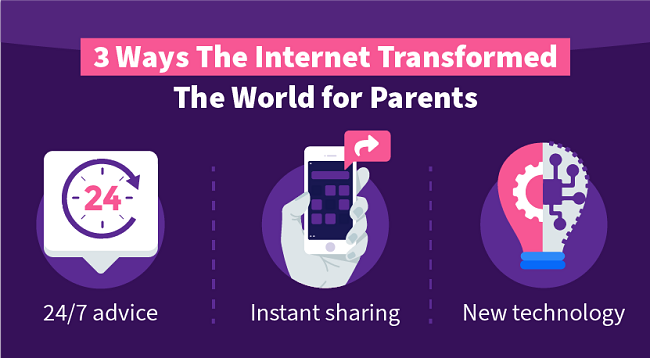
But with these benefits there also come online threats.
For example, pediatricians recommend no screen time or TV for babies under 18 months old. But survey results have shown that 92% of American babies today have watched videos or used apps on a smartphone or tablet before their first birthday.
The doctors say that baby screen time can cause lots of different health and development issues, including problems with their language development and getting bad nights’ sleep.
And this threat to babies’ development is far from being the only risk that the modern, online world poses to babies.
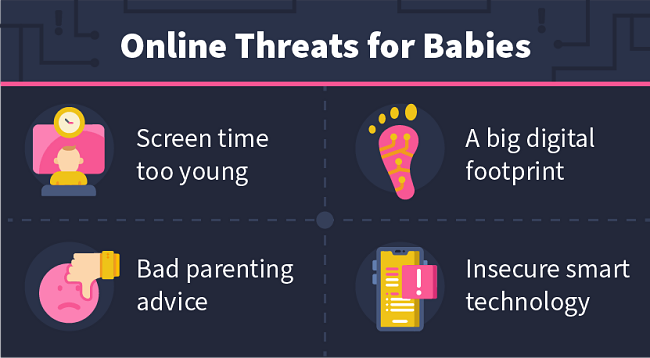
It’s great to instantly share pictures and videos of your baby with distant relatives and close friends.
Instagram or TikTok feeds do the job that our own parents’ wallets did when we were babies: keeping the precious photos of our earliest moments constantly at hand in case an opportunity comes up to share them.
But the perils of social media and so-called “sharenting” aren’t necessarily obvious or easy to understand.
For many kids nowadays, their digital footprint stretches back to before they are even born. From due date announcements to ultrasound photos, the indelible online trace of babies’ personal information exists out there in the wide world before they even enter it.
Social media isn’t only risky when it comes to babies’ privacy; it can be bad for their health and well-being too.
The phenomenon of “echo chambers” in social media groups has led to the spread of fake news and false info in recent years, especially in politics and medicine. From flat-earthers to anti-vaxxers, social media sites have fostered the growth of communities of mistruth.
Lots of parents find helpful advice and emotional support in groups online. However, bad medical advice can easily proliferate on social media, and too many parents (and too many people in general) are too trusting of the advice they receive online.
Finally, the Internet of Things (IoT) exposes babies to more risk than many parents realize. Unsecured smart baby monitors, unprotected cameras in daycare centers, and unsafe home internet connections provide opportunities for cybercriminals to hack into the home.
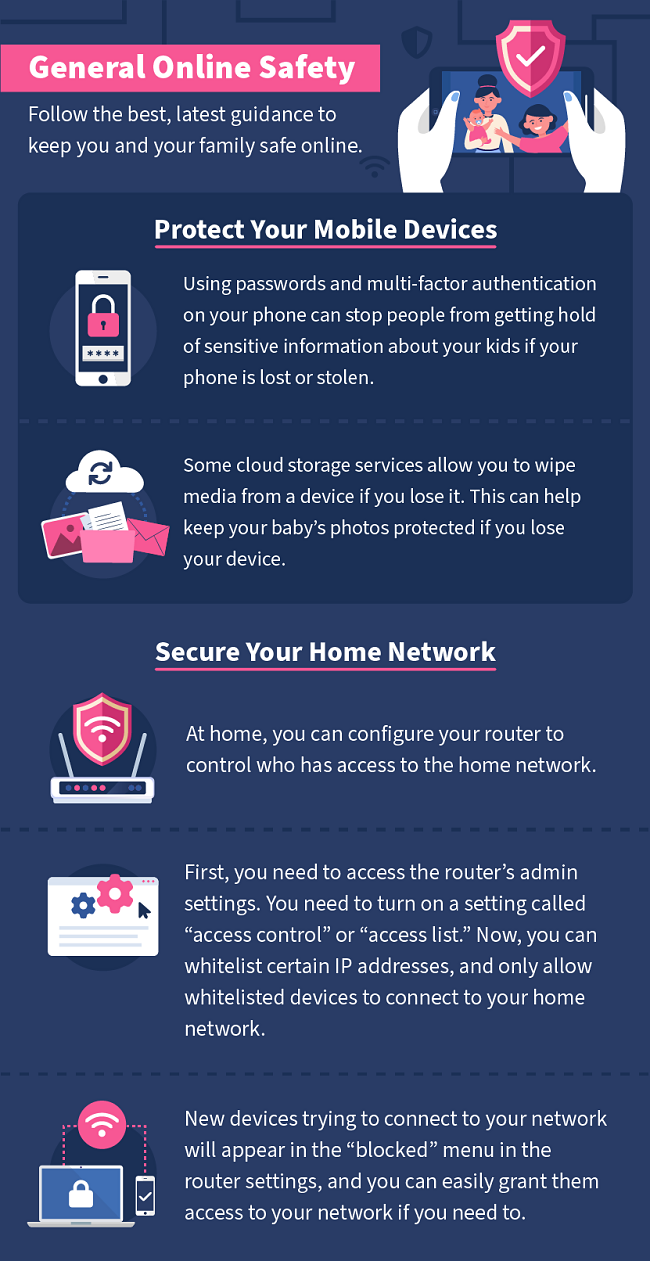
Hacked Baby Monitors and Insecure IoT
Babycare has undergone something of an IoT revolution. Smart baby monitors, bio-sensory devices, WiFi-connected cameras and microphones, and the apps used to interact with them make up an IoT network that may be accessible to hackers anywhere in the world.
TIPS: Secure Your Smart Home
- Use password protection, ideally with multi-factor authentication.
- Check reviews from cybersecurity professionals for any new IoT system you want to install.
- Strip images from baby monitors of any metadata before you share them, or take a screenshot and share that instead.
- Make sure WiFi-enabled toys are using the best security protocols, just like your laptop and phone.
If you do decide to connect baby monitors with the internet so you can watch and listen outside the home, make sure you connect everything safely.
Turn password protection on at a minimum, and ideally use multi-factor authentication. If an internet-connected baby monitor does not have password protection, it is best not to use it at all.
Any smart sensor technology in your home could put your family’s privacy at risk.
This includes smart baby monitors and WiFi-connected baby cameras. Because of this, you want to make sure you have done as much research as possible before installing a system like this. Read customer reviews, check the manufacturer’s website, and review the system’s safety features before making a purchase.
If you post funny moments captured by your baby monitor online, you could be putting yourself even more at risk.
Sometimes, hackers can find out what model monitor you are using and then try their luck with known exploits for that system in the hope you have outdated software or a recall device.
Think carefully about the toys you buy for babies as well. If they contain a lot of sensor devices and they can connect to the internet, then they are vulnerable to hackers.
Everything in your home that connects to the internet could be a vector for hackers to access all of the data and information moving through your home network. Even if it’s just a toy, WiFi-connected devices should be just as secure as your laptop or phone.
What Happens When Baby Monitors Get Hacked?
In 2018, a hacker gained access to a Nest camera in Ellen and Nathan Rigney’s home. The Rigneys were using the device to monitor their 4-month-old son when they heard a stranger’s voice making inappropriate remarks through the baby monitor in their room.
“I’m going to kidnap your baby. I’m in the baby’s room,” the voice said. The parents sprang to their son’s room and fortunately found nobody there. But the lingering presence of the stranger, who had hacked into their Nest system to deliver his terrifying message, was strongly felt.
There are dozens of similar examples, including:
- In 2018, a couple in South Carolina suspected a hacker had taken over their system and independently moved the lens on their baby monitor camera.
- A Rochester couple told local news that they had discovered a website dedicated to hosting images from hacked WiFi-connected cameras. The couple found pictures of their baby on the site.
- A Canadian man recently hacked into a Nest security camera belonging to a family in Phoenix. The intruder said he was a security researcher and was just trying to warn the homeowners about a loophole in their system’s security. He apologized for the intrusion and said that he hoped they would close the loophole before other hackers could use it to harm them.
A security company found 40,000 accessible streams from parents’ baby monitor cameras in the course of just one month’s investigation in 2020. These were all cases where the parents likely had no idea that the streaming video content was accessible to hackers.
It is not only baby monitors and WiFi-connected cameras and microphones that can potentially put your home and baby at risk. Now, many babies’ toys also have in-built cameras and sensors and a WiFi connection.
Cloud Pets were smart teddy bears that let parents and babies send stored messages to each other. However, poor security led to the exposure of 800,000 customers’ messages on the internet.
These messages are clearly valuable: there have already been two incidents to date of hackers demanding money from Cloud Pets in return for the stolen data.
A now-discontinued Fisher-Price product contained a concerning security flaw. The company’s Smart Bear toy featured numerous sensors: a microphone, a camera in the nose, a speaker, a pressure plate, and even an accelerometer.
However, it was discovered that the nose camera had a hardware vulnerability that meant it could be hacked and turned on remotely. Although Fisher-Price recalled the product, it can still be found in some online stores.
What Makes Baby Monitors and IoT Devices Unsafe?
There are four main factors that can make modern baby monitors unsafe.
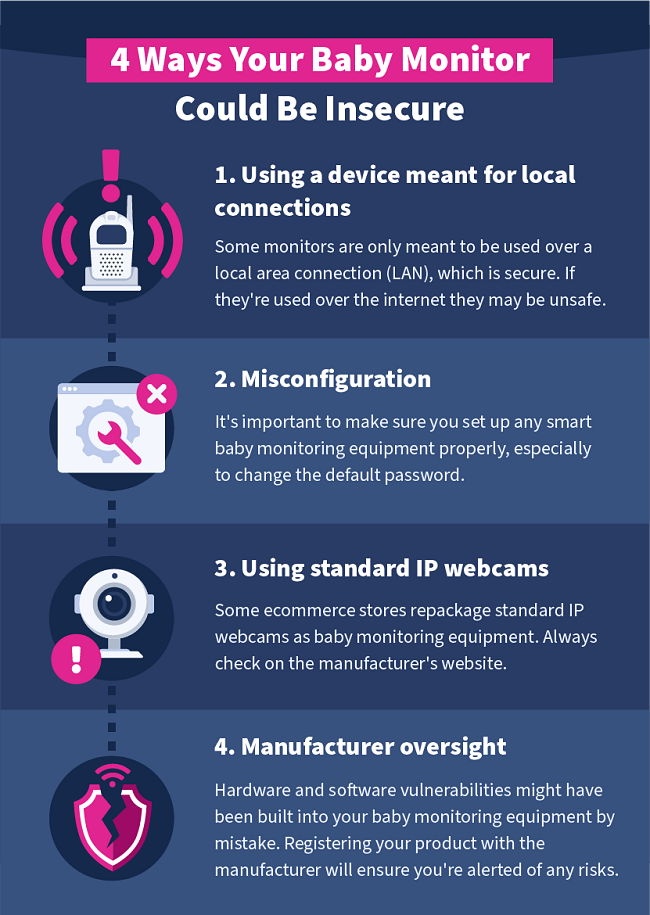
All these factors can be avoided.
Ensuring that any device you use to monitor your baby remotely was intended for that purpose is an excellent first step.
Many daycare centers and nurseries connect CCTV cameras to the internet to enable parents to keep an eye on their kids. This makes those streams vulnerable to attacks, especially when taking the visibility and searchability of daycare centers into account.
For monitoring devices that are designed to be used over the internet, proper setup is usually all that is needed to keep the video stream safe from unwanted viewers.
Choosing and properly configuring systems with password protection at a minimum (and ideally multi-factor authentication) is recommended.
Choosing the right system is not necessarily simple, however. Many e-commerce stores sell IP webcams as baby monitors. These devices are intended to stream live footage for the general public, such as those found at museums, research stations, and public parks.
As such, they lack adequate protection for keeping private video streams secure. Checking the manufacturer’s website will tell parents if a baby monitoring system found on a third-party reseller’s site was actually designed for that purpose.
Checking customer reviews and buying baby monitoring equipment from trusted suppliers can help avoid the risk of exposure due to manufacturer oversight.
Trusted manufacturers and suppliers will alert their customers to potential vulnerabilities in their systems as soon as they are aware of them. So it is also a good idea to register your product with the manufacturer or regularly check their website for any product warnings.
Doctor’s Orders: No Screens for Babies Under 18 Months Old
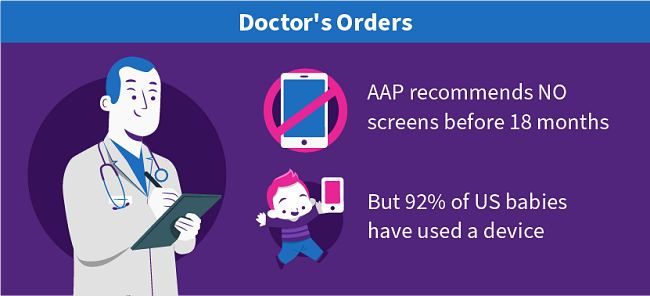
We’ve all seen it, and the most loving parents in the world have probably done it at some point.
Babies won’t stop crying, and you know that if you slip them the tablet or phone, they’ll be distracted and quiet long enough for you to finish your Zoom call in peace.
With gamified dopamine rewards in the form of cheerful noises and bright, flashing colors, mobile apps have become sophisticated time-sinks designed to make adults forget how long they’ve been using them.
For babies, who obviously have no concept of UX design and social engineering, those rewards can be even stronger enticements to become engrossed in the screen.
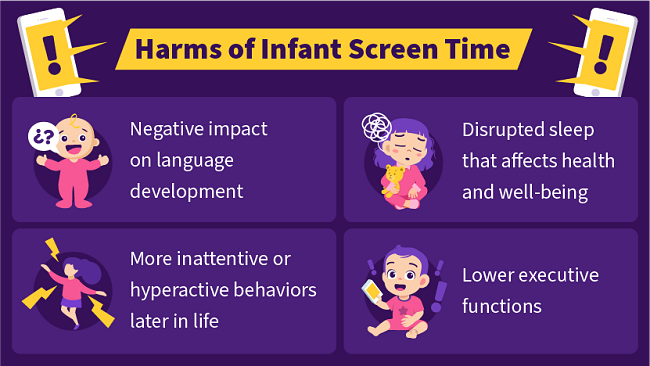
Doctors agree that screen time can negatively affect babies’ language development and harm their immediate health and well-being by disrupting their sleep.
High-quality educational content can be great for preschool-aged children, but screen content can seriously mess up babies’ development.
Too much screen time for babies is connected with more inattentive and hyperactive behaviors, lower executive functions, and at least short-term language development delays.
TIP: Make a Go-To List of Screen Time Alternatives
Having a go-to list of alternatives readily available could help you to soothe or stimulate your baby without resorting to the screen. It’s understandably tough as hell to come up with creative ideas for activities while your baby is screaming in your ear. A list that you can add to when you have ideas – instead of when you need them – could be a lifesaver in times like these.
Really engaging with other people in the physical world is vital for a child’s development. Babies’ brains are constantly absorbing information from the people around them, learning to be social human beings out in the world.
Real person-to-person interactions give babies the opportunity to participate in their environment, which is essential for their overall development.
Parents are their babies’ first and most important teachers!
Finding Inappropriate Content
For toddlers, there’s a lot of great content that’s educational, wholesome, and fun for parents too.
But parents should know what toddlers are watching and supervise while they’re watching; kids’ content online can be seriously upsetting.
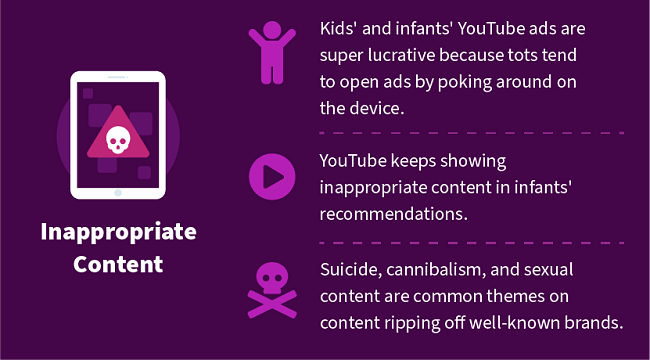
From Disney and CBeebies to the hugely popular British kids’ channel Little Baby Bum, YouTube hosts millions of hours of content for babies.
This content can make a lot of money for channels running ads. That’s because babies are likely to poke around on the screen, attracted by whatever bright lights and flashing colors catch their eyes. Clicks mean money for ad-funded YouTube channels.
But just a few clicks away from a perfectly appropriate baby-focused YouTube video, or even after a few “Watch Next” recommendations, babies’ YouTube starts to get pretty dark.
A recent investigation found a cartoon showing Minnie Mouse’s severed head falling down an escalator and getting trapped in its machinery, spurting blood. At the same time, her babies can be heard crying.
Violent videos, inappropriate sexualization, suicide attempts, and cannibalism are all discoverable from YouTube sidebar recommendations or simple autoplay chains.
There are also hundreds of disturbing videos on YouTube showing popular kids’ cartoon characters, including Peppa Pig, Frozen princesses, Minions, and Thomas the Tank Engine.
YouTube algorithms are made to keep you watching content for as long as possible. They don’t prioritize healthy or useful or educational content for kids’ and babies’ recommendations, just whatever makes the algorithm happy.
TIP: Watch Along with Your Tots
To be safe, it’s probably best to watch videos and online content alongside growing tots. This way, you’ll be confident they aren’t accidentally clicking through to inappropriate material.
Can You Trust Parenting Advice on the Internet?
Websites and social media are increasingly important sources of parenting and health information that moms and dads turn to when they need help to make decisions about their baby’s care.
Parenting is often a completely new experience, and it’s easy to feel overwhelmed.
Traditionally, help for new parents has come from family, friends, and medical professionals. However, recent decades have seen this shift – along with other health topics.
More and more people in the US are now seeking medical and parenting advice on the internet. Social media is frequently used as a source of parenting and health information.
Most parents are generally really positive about the information they find online. They appreciate the immediate affirmation and support they can find in social media groups, and they think the answers they get to their queries on these groups are usually honest.
In most cases, the influence is positive.
With social media, you don’t have to wait for your baby’s next check-up or visit from a healthcare professional. You can get the answers you’re looking for when you need them instead of having to wait.
Many moms and dads with baby questions appreciate the anonymity that the internet affords them, allowing them to ask potentially embarrassing questions.
Social media also helps parents crowdsource information, gathering opinions and resources from multiple people, and building up what often feels like a well-rounded understanding.
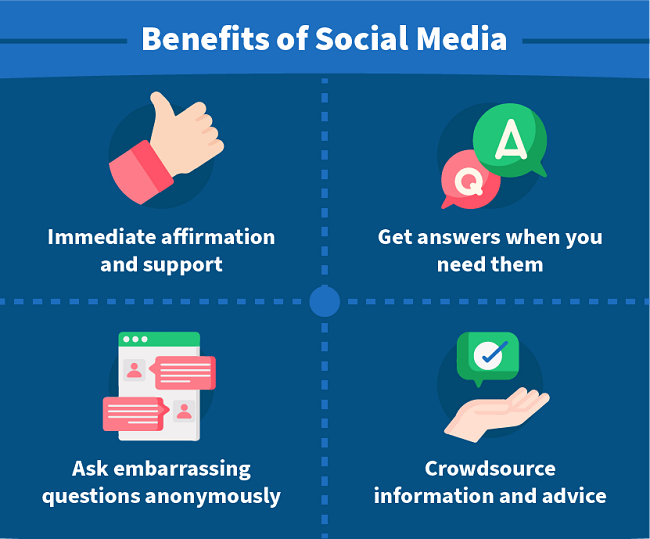
Social media groups give moms and dads access to way more opinions than they could find in their physical or geographic networks, which in turn gives them more confidence in the information they receive from these groups.
But this is also problematic. Up to 25% of comments on parenting blogs contain inaccurate health information.
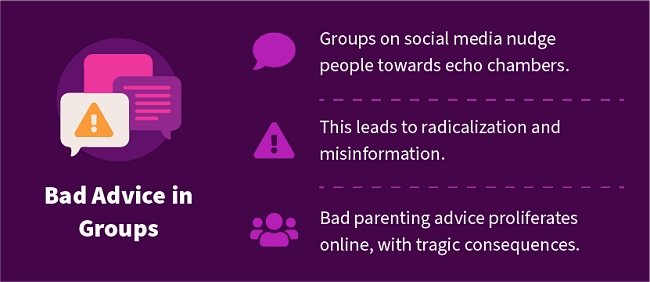
There are, tragically, some instances of horrible parenting advice on social media groups leading to babies’ harm and even death.
For example, private Facebook groups were recently found to be urging parents to “treat” their children on the autistic spectrum with poisonous chlorine dioxide.
Judith and the Freebirth Movement
NBC News portrayed a mother’s experience with the so-called “freebirth movement” on social media, which highlights the extreme end of the problem of bad parenting advice coming through on social media.
“Judith” was drawn to alternative birth groups on Facebook, eventually following Instagram accounts, consuming hours of podcasts, and paying for online courses during her pregnancy.
The algorithms designed to keep us hooked to our social media feeds nudged Judith further into this online echo chamber.
Social media provided her with support and inspiration. She read about other mothers’ experiences and fantasized about appearing on podcasts and sharing her own freebirth story.
But the advice she received was extremely bad, and it ultimately had tragic consequences.
Judith still had not given birth at 45 weeks and had not sought any medical assistance on the advice and encouragement of the groups she was a part of. Despite medical professionals recommending inducement at 42 weeks, members of Judith’s online network encouraged her to “ride it out” and stay at home.
Eventually, Judith was forced to go to the emergency room. Her baby’s heart stopped beating during an intense labor process that was also dangerous for her.
The NBC News article stressed the delicacy of balancing maternal autonomy with the benefits of having skilled care for birth.
Unfortunately, women’s concerns with “medicalized” birth are not entirely ill-founded, and this is what leads them to turn to social media for help.
One in six women has reported mistreatment by medical professionals during pregnancy or childbirth. These incidents included verbal abuse, threats, ignored pleas for help, violations of personal privacy, and physical abuse.
TIP: Check the Facts
Treat parenting advice just like you treat news and medical information. Consider the source, its reliability, and potential motivation for giving bad information.
In recent years, much attention has been raised about social media’s impact on people’s political views and its ability to nudge them towards extremism. Algorithms designed to keep you scrolling the feed, engaging with content, and returning over and over again have created platforms for radicalization and misinformation.
Bad health advice is proliferating on social media in the same ways that extremist political views have. These groups isolate people in echo chambers and feed them content that’s geared to trigger as much of an emotional reaction from them as possible.
Influencers’ Influence
Influencers can be a really positive, well, influence on parents and expectant mothers and fathers. But do influencers have too much influence?
In a recent survey, Pew Research Center found that 68% of parents think that parenting is harder than 20 years ago. Nearly half of the respondents cited either technology, in general, or social media, in general, as the main reasons. 14% said technology exposing kids to inappropriate material at a younger age was the main reason, 5% said smartphones, in general, and 3% cited online predators.
A small number of parents surveyed (7%) said parenting was easier now than it was 20 years ago, with 60% of these citing either more information on parenting being available or access to technology and tech advances as the main reason for their answer.
When it comes to advice from influencers, these stats and attitudes are a double-edged sword.
On the one hand, it’s true that lots of good information and advice is being shared by influencers. But it’s also true that influencers can have a very negative impact on their followers, including parents.
A recent study found that 90% of the large medical accounts researched had shared inaccurate health information.
TIP: Double-Check the Facts!
It’s always worth checking with your doctor or midwife if you’re concerned about health information that’s been shared by influencers.
A spokeswoman for the AAP and pediatrician with Children’s Hospital Los Angeles, Dr. Corinn Cross, says that influencers often share bad parenting advice because there’s a market for it.
As reported by Healthline, Cross said that influencers and social media, in general, have created a lot of “rules,” especially for women, on how to approach the various parenting milestones in a child’s life. And that’s partly because posts like these generate a lot of interaction from their followers.
This can turn into a kind of shaming that was recently investigated by researchers Margaret Quinlan and Bethany Johnson.
Quinlan, a professor of communication and interdisciplinary health psychology researcher with the University of North Carolina at Charlotte, co-authored You’re Doing It Wrong! Mothering, Media, and Medical Expertise with her friend Johnson.
The acclaimed book goes into the unprecedented pressures exerted by social media and influencers on new moms dealing with ancient and modern concerns about parenthood, from before their child’s conception through to their toddler ages.
Quinlan and Johnson explain that new mothers today listen to a lot of different voices talking about ideal parenthood all at once. Sometimes, they say, this cacophony drowns out moms’ natural instincts.
San Francisco-based women’s and maternal mental health therapist Shana Averbach says that always looking to influencers, even if they’re experts, can be overwhelming for new parents and can even distract them from their child’s immediate needs.
TIP: Trust Your Instincts!
Cross, Quinlan, Johnson, and Averbach all recommend new parents trust their own parental instincts. Babies develop individually, and comparing milestones with an influencer’s baby you’ve never met is a one-sided exercise.
The Perils of Sharenting
Some babies already have a digital footprint – an indelible online trace of their personal information – before they are born.
Parents posting ultrasound photos and pregnancy updates on their social media profiles are sharing information that will be personal to their unborn baby once they’ve entered the world.
This digital footprint expands once the baby is born, as proud parents share photos, updates, and even medical information about their newborn children.
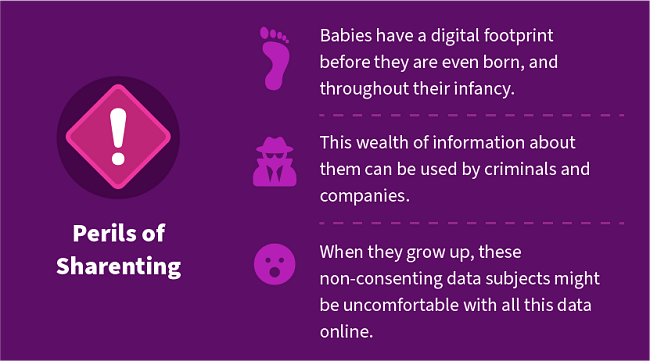
This desire to share is perfectly natural. But the shift from direct, private communication with family and friends to public, open communication with everybody who can access your social media is significant.
This new phenomenon has been called “sharenting,” and it introduces new online risks to babies.
Sharenting has many implicit risks for babies that cannot be avoided. The simplest way to avoid these risks is to simply avoid sharing pictures, videos, and updates from your baby on social media.
Using closed WhatsApp groups can be a good way of sharing pictures with friends and family that only they can see.
TIPS: Safe Sharenting
If you do choose to share on social media, there are a few things you can do to make sure it’s as safe as possible for your baby:
- Check your privacy settings, restrict posts to friends only, and make sure people can’t reshare your photos on the platform.
- Ask family and friends to respect your baby’s privacy and always ask you before sharing photos. Don’t let them post if their profiles are open or public.
- Remove friends and followers who you don’t know well. If you want to post photos of your baby online, you can’t afford to add people you don’t know out of politeness.
- Turn off EXIF data and geotagging on your posts, or use social media platforms that strip this automatically.
- Do not post identifiable information like your baby’s full name, date of birth, home address, or school. Many parents use nicknames on social media to avoid sharing their baby’s real name.
Privacy Please!
There could be long-term implications for your baby if you share too much of their personal information.
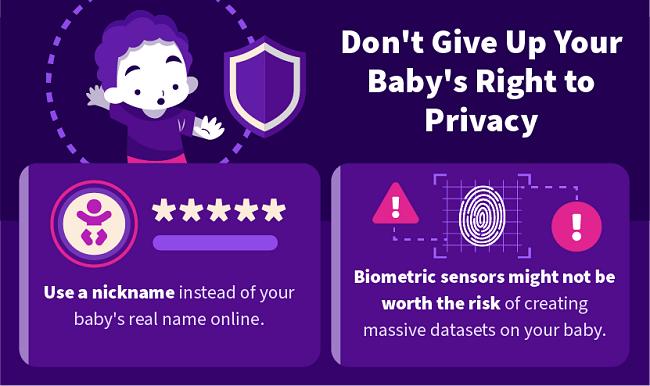
Bio-sensory devices attached to your baby are also gathering vast amounts of highly personal health information about them. In the future, this data could be used to assess their health insurance eligibility or screen them for jobs.
This is a much bigger issue and is a potential threat to all of us, not just babies.
As more elements of daily life are used to gather large amounts of data on the public, this data is also increasingly being used to control access to essential services.
Rent reference checks, applications for work or school, and access to health insurance are all frequently mediated by algorithms mining your personal data. This phenomenon is even impacting policing and court sentencing.
While everybody is at risk of this kind of massive data collection and its as-yet-unknown consequences, babies are uniquely vulnerable.
If you are concerned about the ways data like this could be abused in the future, you should be careful to minimize the amount of information you share about your baby as much as possible.
That includes minimizing or even just getting rid of any products that mine your baby’s data. As well as smart toys and baby monitors, this includes YouTube and baby games apps as well.
TIP: Respecting Your Baby’s Privacy
Being mindful of your baby’s privacy and rights from an early age can help you get in the good habit of respecting their privacy when they are old enough to understand it. This helps children gain a sense of autonomy and teaches them about the dangers of sharing information online. Children growing up without any privacy might grow up with little understanding of their or others’ rights to privacy.
What Are the Privacy Risks for Babies?
While babies obviously cannot consent to the sharing of their personal data, the indestructible reproducibility of digital media means that it may still be accessible once they are old enough to view it.
At that point, discovering their entire life has been documented and shared with total strangers to them, children will undoubtedly be within their rights to feel like their privacy was and is being invaded. I certainly would be.
As well as invading their privacy, posting photos and information about babies online is predicted to lead to more identity fraud in the future.
UK bank Barclays has forecast that sharenting will be responsible for two-thirds of identity fraud cases by 2030, resulting in hundreds of millions of dollars of stolen money each year.
All you need to open a bank account in the US is a name, a date of birth, and an address. Parents willingly post this information all the time on social media in the form of birthday announcements and geotagged photos. Once the child turns 18, criminals armed with these simple details can open an account in your child’s name.
As well as putting babies at risk of future fraud, sharenting can also result in serious threats to babies’ safety.
The Australian Government’s Children’s e-Safety Commissioner recently found one child pornography website containing 45 million images of children. Half of these images were taken from social media accounts. They were innocent photos of regular family activities, but the site showed them alongside disgusting, inappropriate comments.
Strangers who intend to harm your baby, as well as known aggressors, can also find information about your address, daycare facility, and other family members from the information you post on social media.
Geotagged photos, again, are a common vulnerability that many parents are not aware of.
The Modern Online World
The modern online world is full of opportunities for you and your baby, but it’s not without its risks.
Parenting has fundamentally changed with the advent of the internet and smart technology. In many ways, this has been for the better. Parents have more access to medical and parenting advice, supportive communities, and monitoring technologies.
However, these advantages also introduce fresh risks to the health, safety, and privacy of babies. If you are a parent worried about these risks, you can act now to ensure your baby’s safety.
Sources
- Associations Between Screen-Based Media Use and Brain White Matter Integrity in Preschool-Aged Children – John S. Hutton, et al., Jama Pediatrics
- Children’s YouTube is still churning out blood, suicide and cannibalism – Wired
- Could your baby monitor be unsafe and unsecured? – Safety Detectives
- Health information seeking by parents in the Internet age – Kaylyn Khoo, et al., Journal of Pediatrics and Child Health
- ‘I brainwashed myself with the internet’ – NBC News
- If You Have One Of These Toys In Your House, You May Want To Stop Using It – Huffington Post
- Man hacks wireless baby monitor, makes vulgar threats to family – Click2Houston
- Millions of social media photos found on child exploitation sharing sites – Sydney Morning Herald
- Mothers’ Perceptions of the Internet and Social Media as Sources of Parenting and Health Information: Qualitative Study – Rachel Y. Moon, et al., Journal of Medical Internet Research
- Parents are poisoning their children with bleach to ‘cure’ autism. These moms are trying to stop it. – NBC News
- Parents’ attitudes – and experiences – related to digital technology – Pew Research Center
- Phoenix man says hacker talked to him through a Nest security camera in his home – AZCentral
- Police: Baby Monitor Hacked In Rochester – CBS Minnesota
- Posting About Your Kids Online Could Damage Their Futures – Forbes
- ‘Sharenting’ puts young at risk of online fraud – BBC News
- South Carolina parents say baby monitor was hacked after camera lens moved on its own – ABC News
- Study scrutinizes credibility of weight management blogs by most – EurekAlert
- The disturbing YouTube videos that are tricking children – BBC News
- The Giving Voice to Mothers study: inequity and mistreatment during pregnancy and childbirth in the United States – Saraswathi Vedam, et al., Reproductive Health
- The relationship between television exposure and children’s cognition and behaviour: A systematic review – Katarzyna Kostyrka-Allchorne, Nicholas R.Cooper, and Andrew Simpson, Developmental Review
- Vaccination Discussion among Parents on Social Media: A Content Analysis of Comments on Parenting Blogs Marina C. Jenkins and Megan A. Moreno, Journal of Health Communication
- ‘You’re Doing it Wrong’ — The Long History of Mom Shaming – Healthline




Leave a Comment
Cancel